Mental Health Care Report: Case Study of Lucinda's Condition
VerifiedAdded on 2023/01/03
|10
|2407
|53
Report
AI Summary
This report presents a detailed analysis of a mental health case study involving a 22-year-old pregnant woman named Lucinda, who is experiencing mental health challenges following the birth of her first child. The report begins with a Mental State Examination (MSE) to assess Lucinda's psychological condition, considering her appearance, eye contact, motor activity, mood, and thought processes. It then applies the stress vulnerability model to explore past stressful events, such as a traumatic delivery, and identifies factors contributing to her current condition, including her history and current responsibilities. The report also discusses how hope, respect, and empowerment can aid in Lucinda's recovery, emphasizing the importance of tailored interventions. The report includes the analysis of Lucinda's condition, the application of the stress-vulnerability model, and suggestions for recovery through hope, respect, and empowerment.
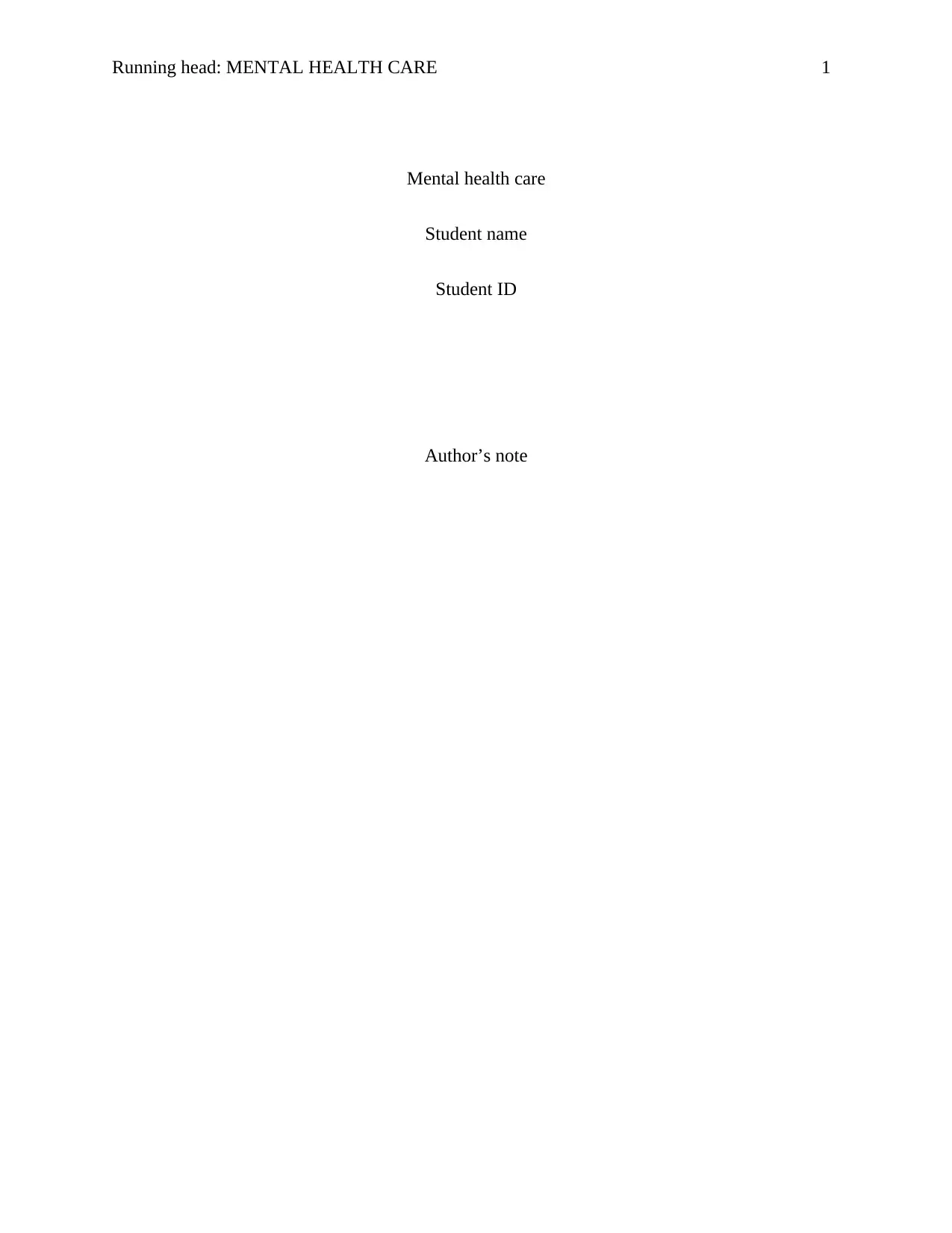
Running head: MENTAL HEALTH CARE 1
Mental health care
Student name
Student ID
Author’s note
Mental health care
Student name
Student ID
Author’s note
Paraphrase This Document
Need a fresh take? Get an instant paraphrase of this document with our AI Paraphraser
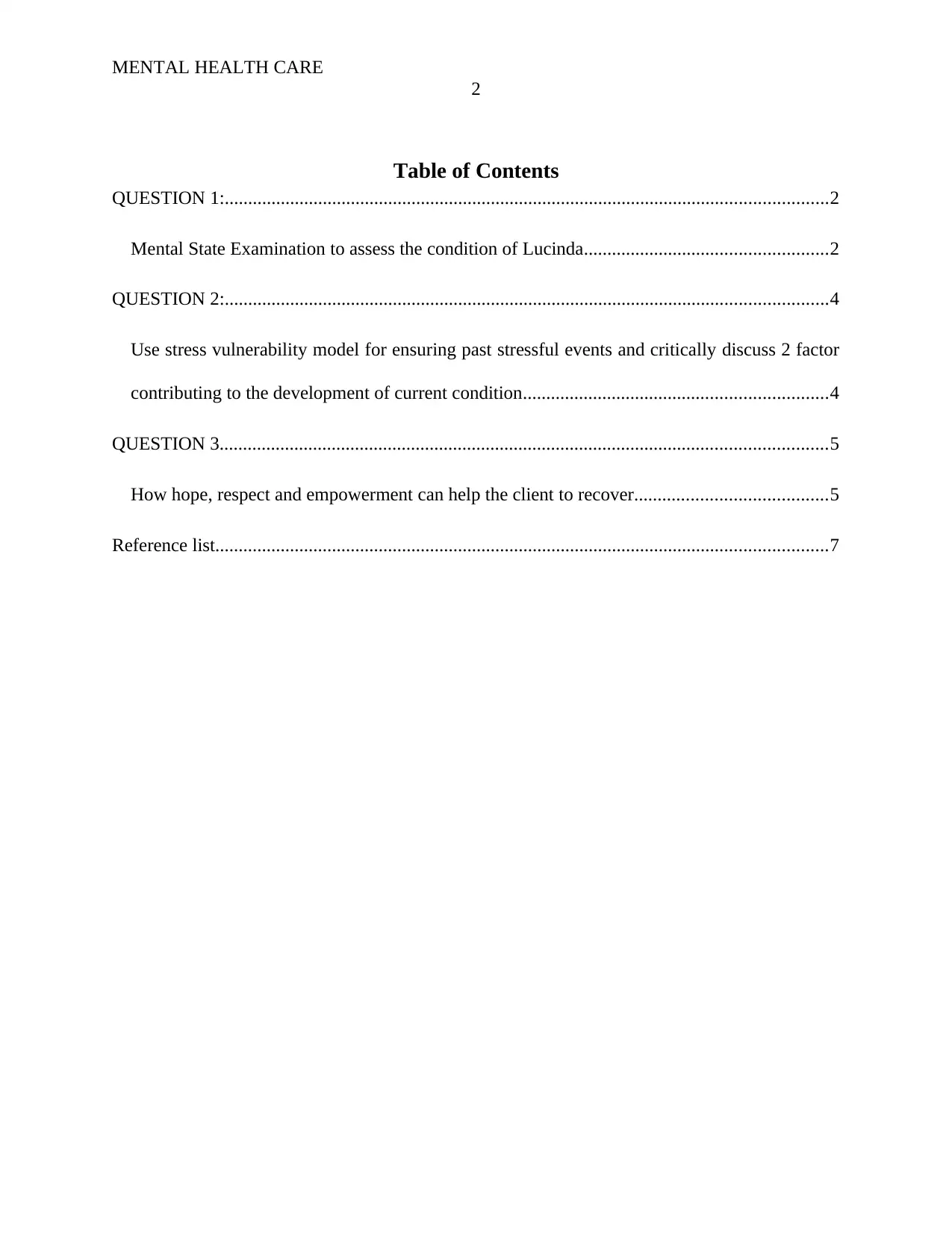
MENTAL HEALTH CARE
2
Table of Contents
QUESTION 1:.................................................................................................................................2
Mental State Examination to assess the condition of Lucinda....................................................2
QUESTION 2:.................................................................................................................................4
Use stress vulnerability model for ensuring past stressful events and critically discuss 2 factor
contributing to the development of current condition.................................................................4
QUESTION 3..................................................................................................................................5
How hope, respect and empowerment can help the client to recover.........................................5
Reference list...................................................................................................................................7
2
Table of Contents
QUESTION 1:.................................................................................................................................2
Mental State Examination to assess the condition of Lucinda....................................................2
QUESTION 2:.................................................................................................................................4
Use stress vulnerability model for ensuring past stressful events and critically discuss 2 factor
contributing to the development of current condition.................................................................4
QUESTION 3..................................................................................................................................5
How hope, respect and empowerment can help the client to recover.........................................5
Reference list...................................................................................................................................7
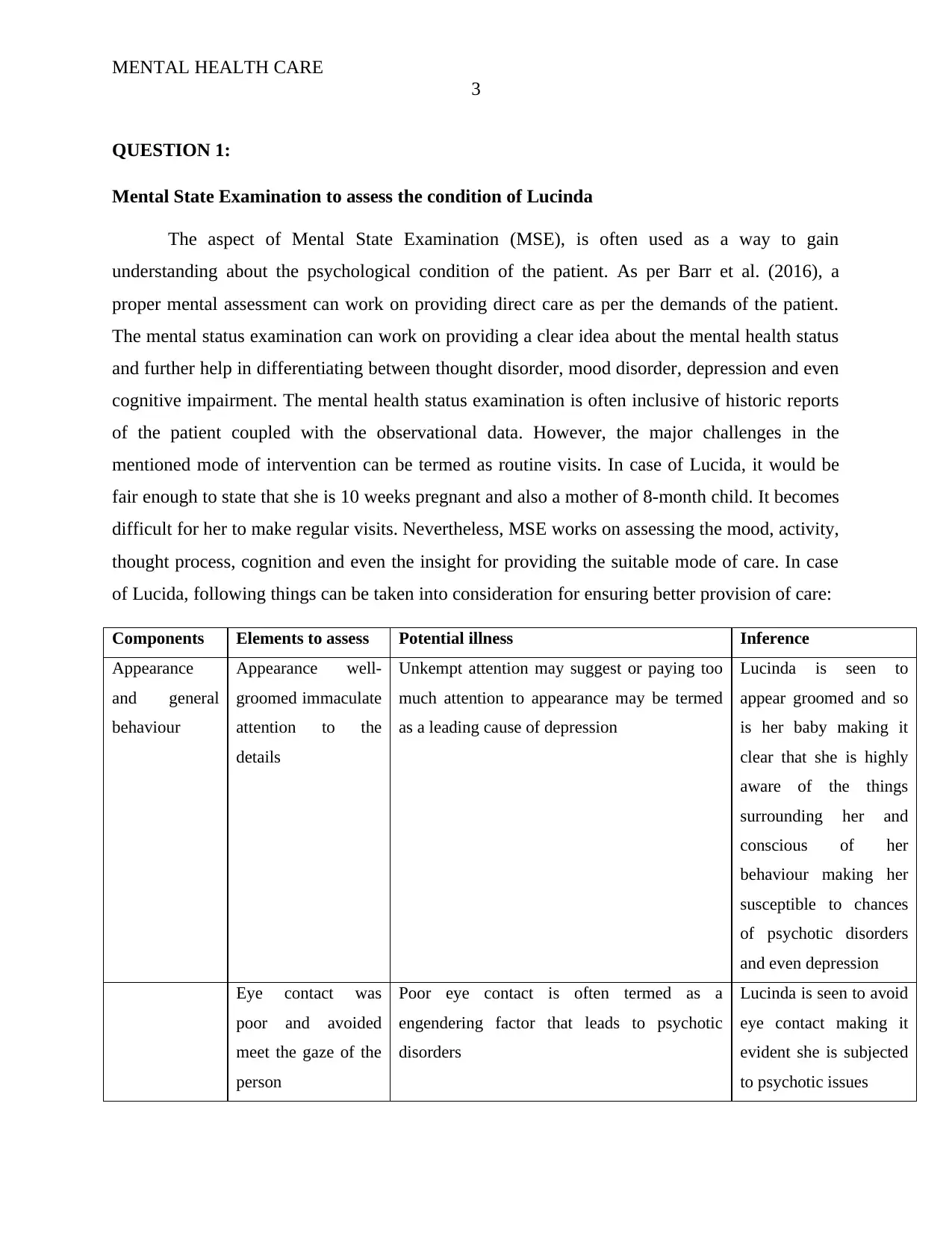
MENTAL HEALTH CARE
3
QUESTION 1:
Mental State Examination to assess the condition of Lucinda
The aspect of Mental State Examination (MSE), is often used as a way to gain
understanding about the psychological condition of the patient. As per Barr et al. (2016), a
proper mental assessment can work on providing direct care as per the demands of the patient.
The mental status examination can work on providing a clear idea about the mental health status
and further help in differentiating between thought disorder, mood disorder, depression and even
cognitive impairment. The mental health status examination is often inclusive of historic reports
of the patient coupled with the observational data. However, the major challenges in the
mentioned mode of intervention can be termed as routine visits. In case of Lucida, it would be
fair enough to state that she is 10 weeks pregnant and also a mother of 8-month child. It becomes
difficult for her to make regular visits. Nevertheless, MSE works on assessing the mood, activity,
thought process, cognition and even the insight for providing the suitable mode of care. In case
of Lucida, following things can be taken into consideration for ensuring better provision of care:
Components Elements to assess Potential illness Inference
Appearance
and general
behaviour
Appearance well-
groomed immaculate
attention to the
details
Unkempt attention may suggest or paying too
much attention to appearance may be termed
as a leading cause of depression
Lucinda is seen to
appear groomed and so
is her baby making it
clear that she is highly
aware of the things
surrounding her and
conscious of her
behaviour making her
susceptible to chances
of psychotic disorders
and even depression
Eye contact was
poor and avoided
meet the gaze of the
person
Poor eye contact is often termed as a
engendering factor that leads to psychotic
disorders
Lucinda is seen to avoid
eye contact making it
evident she is subjected
to psychotic issues
3
QUESTION 1:
Mental State Examination to assess the condition of Lucinda
The aspect of Mental State Examination (MSE), is often used as a way to gain
understanding about the psychological condition of the patient. As per Barr et al. (2016), a
proper mental assessment can work on providing direct care as per the demands of the patient.
The mental status examination can work on providing a clear idea about the mental health status
and further help in differentiating between thought disorder, mood disorder, depression and even
cognitive impairment. The mental health status examination is often inclusive of historic reports
of the patient coupled with the observational data. However, the major challenges in the
mentioned mode of intervention can be termed as routine visits. In case of Lucida, it would be
fair enough to state that she is 10 weeks pregnant and also a mother of 8-month child. It becomes
difficult for her to make regular visits. Nevertheless, MSE works on assessing the mood, activity,
thought process, cognition and even the insight for providing the suitable mode of care. In case
of Lucida, following things can be taken into consideration for ensuring better provision of care:
Components Elements to assess Potential illness Inference
Appearance
and general
behaviour
Appearance well-
groomed immaculate
attention to the
details
Unkempt attention may suggest or paying too
much attention to appearance may be termed
as a leading cause of depression
Lucinda is seen to
appear groomed and so
is her baby making it
clear that she is highly
aware of the things
surrounding her and
conscious of her
behaviour making her
susceptible to chances
of psychotic disorders
and even depression
Eye contact was
poor and avoided
meet the gaze of the
person
Poor eye contact is often termed as a
engendering factor that leads to psychotic
disorders
Lucinda is seen to avoid
eye contact making it
evident she is subjected
to psychotic issues
⊘ This is a preview!⊘
Do you want full access?
Subscribe today to unlock all pages.

Trusted by 1+ million students worldwide
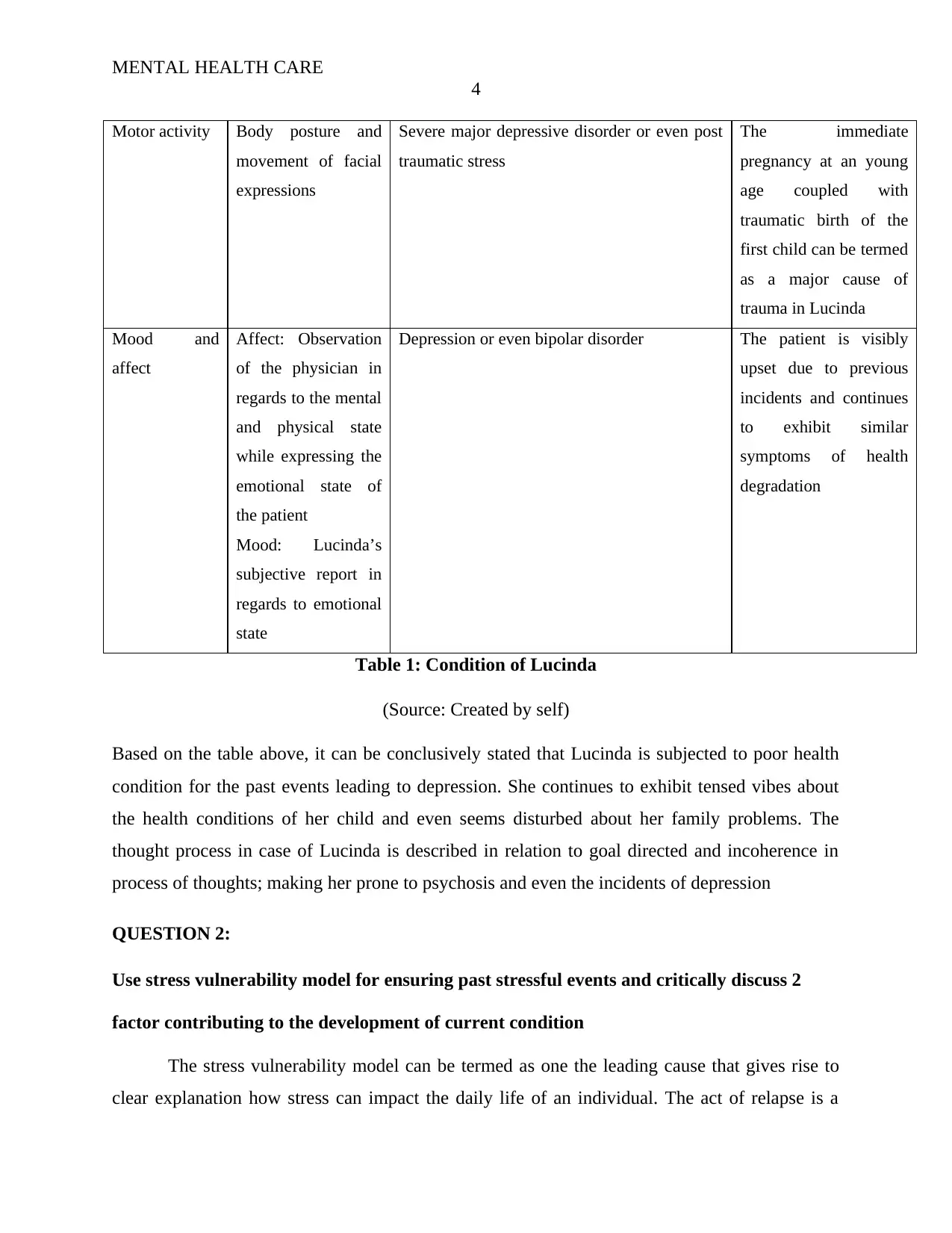
MENTAL HEALTH CARE
4
Motor activity Body posture and
movement of facial
expressions
Severe major depressive disorder or even post
traumatic stress
The immediate
pregnancy at an young
age coupled with
traumatic birth of the
first child can be termed
as a major cause of
trauma in Lucinda
Mood and
affect
Affect: Observation
of the physician in
regards to the mental
and physical state
while expressing the
emotional state of
the patient
Mood: Lucinda’s
subjective report in
regards to emotional
state
Depression or even bipolar disorder The patient is visibly
upset due to previous
incidents and continues
to exhibit similar
symptoms of health
degradation
Table 1: Condition of Lucinda
(Source: Created by self)
Based on the table above, it can be conclusively stated that Lucinda is subjected to poor health
condition for the past events leading to depression. She continues to exhibit tensed vibes about
the health conditions of her child and even seems disturbed about her family problems. The
thought process in case of Lucinda is described in relation to goal directed and incoherence in
process of thoughts; making her prone to psychosis and even the incidents of depression
QUESTION 2:
Use stress vulnerability model for ensuring past stressful events and critically discuss 2
factor contributing to the development of current condition
The stress vulnerability model can be termed as one the leading cause that gives rise to
clear explanation how stress can impact the daily life of an individual. The act of relapse is a
4
Motor activity Body posture and
movement of facial
expressions
Severe major depressive disorder or even post
traumatic stress
The immediate
pregnancy at an young
age coupled with
traumatic birth of the
first child can be termed
as a major cause of
trauma in Lucinda
Mood and
affect
Affect: Observation
of the physician in
regards to the mental
and physical state
while expressing the
emotional state of
the patient
Mood: Lucinda’s
subjective report in
regards to emotional
state
Depression or even bipolar disorder The patient is visibly
upset due to previous
incidents and continues
to exhibit similar
symptoms of health
degradation
Table 1: Condition of Lucinda
(Source: Created by self)
Based on the table above, it can be conclusively stated that Lucinda is subjected to poor health
condition for the past events leading to depression. She continues to exhibit tensed vibes about
the health conditions of her child and even seems disturbed about her family problems. The
thought process in case of Lucinda is described in relation to goal directed and incoherence in
process of thoughts; making her prone to psychosis and even the incidents of depression
QUESTION 2:
Use stress vulnerability model for ensuring past stressful events and critically discuss 2
factor contributing to the development of current condition
The stress vulnerability model can be termed as one the leading cause that gives rise to
clear explanation how stress can impact the daily life of an individual. The act of relapse is a
Paraphrase This Document
Need a fresh take? Get an instant paraphrase of this document with our AI Paraphraser
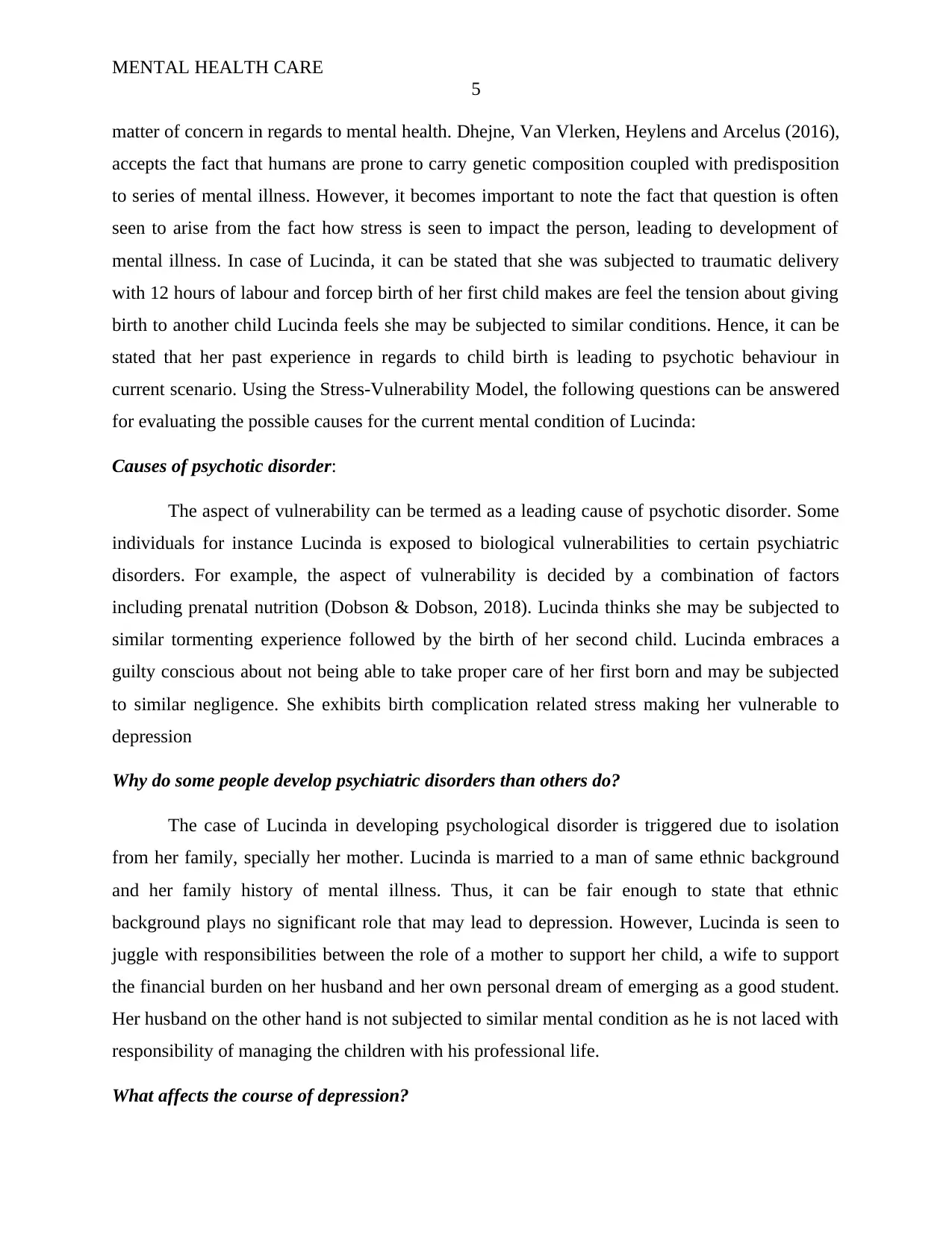
MENTAL HEALTH CARE
5
matter of concern in regards to mental health. Dhejne, Van Vlerken, Heylens and Arcelus (2016),
accepts the fact that humans are prone to carry genetic composition coupled with predisposition
to series of mental illness. However, it becomes important to note the fact that question is often
seen to arise from the fact how stress is seen to impact the person, leading to development of
mental illness. In case of Lucinda, it can be stated that she was subjected to traumatic delivery
with 12 hours of labour and forcep birth of her first child makes are feel the tension about giving
birth to another child Lucinda feels she may be subjected to similar conditions. Hence, it can be
stated that her past experience in regards to child birth is leading to psychotic behaviour in
current scenario. Using the Stress-Vulnerability Model, the following questions can be answered
for evaluating the possible causes for the current mental condition of Lucinda:
Causes of psychotic disorder:
The aspect of vulnerability can be termed as a leading cause of psychotic disorder. Some
individuals for instance Lucinda is exposed to biological vulnerabilities to certain psychiatric
disorders. For example, the aspect of vulnerability is decided by a combination of factors
including prenatal nutrition (Dobson & Dobson, 2018). Lucinda thinks she may be subjected to
similar tormenting experience followed by the birth of her second child. Lucinda embraces a
guilty conscious about not being able to take proper care of her first born and may be subjected
to similar negligence. She exhibits birth complication related stress making her vulnerable to
depression
Why do some people develop psychiatric disorders than others do?
The case of Lucinda in developing psychological disorder is triggered due to isolation
from her family, specially her mother. Lucinda is married to a man of same ethnic background
and her family history of mental illness. Thus, it can be fair enough to state that ethnic
background plays no significant role that may lead to depression. However, Lucinda is seen to
juggle with responsibilities between the role of a mother to support her child, a wife to support
the financial burden on her husband and her own personal dream of emerging as a good student.
Her husband on the other hand is not subjected to similar mental condition as he is not laced with
responsibility of managing the children with his professional life.
What affects the course of depression?
5
matter of concern in regards to mental health. Dhejne, Van Vlerken, Heylens and Arcelus (2016),
accepts the fact that humans are prone to carry genetic composition coupled with predisposition
to series of mental illness. However, it becomes important to note the fact that question is often
seen to arise from the fact how stress is seen to impact the person, leading to development of
mental illness. In case of Lucinda, it can be stated that she was subjected to traumatic delivery
with 12 hours of labour and forcep birth of her first child makes are feel the tension about giving
birth to another child Lucinda feels she may be subjected to similar conditions. Hence, it can be
stated that her past experience in regards to child birth is leading to psychotic behaviour in
current scenario. Using the Stress-Vulnerability Model, the following questions can be answered
for evaluating the possible causes for the current mental condition of Lucinda:
Causes of psychotic disorder:
The aspect of vulnerability can be termed as a leading cause of psychotic disorder. Some
individuals for instance Lucinda is exposed to biological vulnerabilities to certain psychiatric
disorders. For example, the aspect of vulnerability is decided by a combination of factors
including prenatal nutrition (Dobson & Dobson, 2018). Lucinda thinks she may be subjected to
similar tormenting experience followed by the birth of her second child. Lucinda embraces a
guilty conscious about not being able to take proper care of her first born and may be subjected
to similar negligence. She exhibits birth complication related stress making her vulnerable to
depression
Why do some people develop psychiatric disorders than others do?
The case of Lucinda in developing psychological disorder is triggered due to isolation
from her family, specially her mother. Lucinda is married to a man of same ethnic background
and her family history of mental illness. Thus, it can be fair enough to state that ethnic
background plays no significant role that may lead to depression. However, Lucinda is seen to
juggle with responsibilities between the role of a mother to support her child, a wife to support
the financial burden on her husband and her own personal dream of emerging as a good student.
Her husband on the other hand is not subjected to similar mental condition as he is not laced with
responsibility of managing the children with his professional life.
What affects the course of depression?
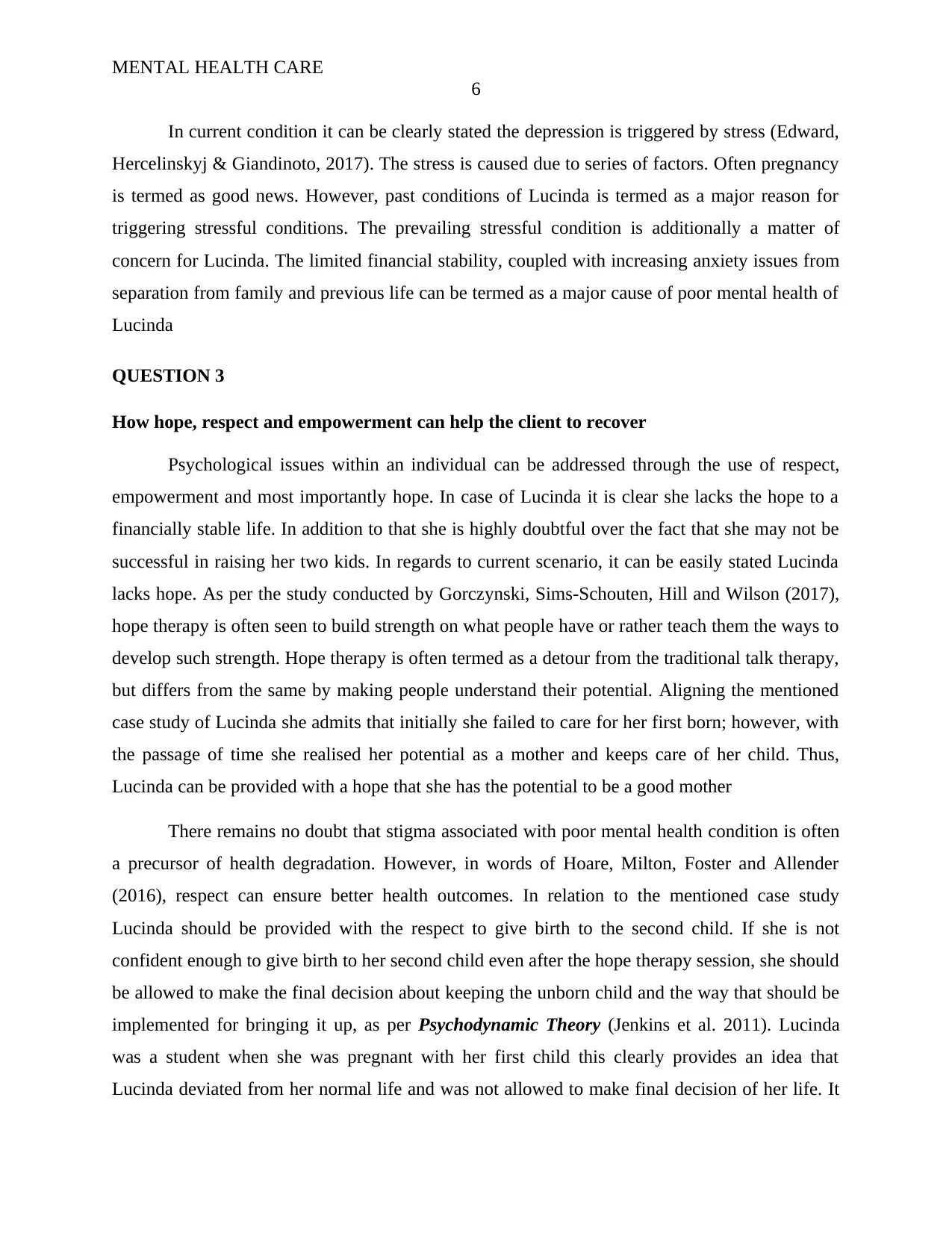
MENTAL HEALTH CARE
6
In current condition it can be clearly stated the depression is triggered by stress (Edward,
Hercelinskyj & Giandinoto, 2017). The stress is caused due to series of factors. Often pregnancy
is termed as good news. However, past conditions of Lucinda is termed as a major reason for
triggering stressful conditions. The prevailing stressful condition is additionally a matter of
concern for Lucinda. The limited financial stability, coupled with increasing anxiety issues from
separation from family and previous life can be termed as a major cause of poor mental health of
Lucinda
QUESTION 3
How hope, respect and empowerment can help the client to recover
Psychological issues within an individual can be addressed through the use of respect,
empowerment and most importantly hope. In case of Lucinda it is clear she lacks the hope to a
financially stable life. In addition to that she is highly doubtful over the fact that she may not be
successful in raising her two kids. In regards to current scenario, it can be easily stated Lucinda
lacks hope. As per the study conducted by Gorczynski, Sims-Schouten, Hill and Wilson (2017),
hope therapy is often seen to build strength on what people have or rather teach them the ways to
develop such strength. Hope therapy is often termed as a detour from the traditional talk therapy,
but differs from the same by making people understand their potential. Aligning the mentioned
case study of Lucinda she admits that initially she failed to care for her first born; however, with
the passage of time she realised her potential as a mother and keeps care of her child. Thus,
Lucinda can be provided with a hope that she has the potential to be a good mother
There remains no doubt that stigma associated with poor mental health condition is often
a precursor of health degradation. However, in words of Hoare, Milton, Foster and Allender
(2016), respect can ensure better health outcomes. In relation to the mentioned case study
Lucinda should be provided with the respect to give birth to the second child. If she is not
confident enough to give birth to her second child even after the hope therapy session, she should
be allowed to make the final decision about keeping the unborn child and the way that should be
implemented for bringing it up, as per Psychodynamic Theory (Jenkins et al. 2011). Lucinda
was a student when she was pregnant with her first child this clearly provides an idea that
Lucinda deviated from her normal life and was not allowed to make final decision of her life. It
6
In current condition it can be clearly stated the depression is triggered by stress (Edward,
Hercelinskyj & Giandinoto, 2017). The stress is caused due to series of factors. Often pregnancy
is termed as good news. However, past conditions of Lucinda is termed as a major reason for
triggering stressful conditions. The prevailing stressful condition is additionally a matter of
concern for Lucinda. The limited financial stability, coupled with increasing anxiety issues from
separation from family and previous life can be termed as a major cause of poor mental health of
Lucinda
QUESTION 3
How hope, respect and empowerment can help the client to recover
Psychological issues within an individual can be addressed through the use of respect,
empowerment and most importantly hope. In case of Lucinda it is clear she lacks the hope to a
financially stable life. In addition to that she is highly doubtful over the fact that she may not be
successful in raising her two kids. In regards to current scenario, it can be easily stated Lucinda
lacks hope. As per the study conducted by Gorczynski, Sims-Schouten, Hill and Wilson (2017),
hope therapy is often seen to build strength on what people have or rather teach them the ways to
develop such strength. Hope therapy is often termed as a detour from the traditional talk therapy,
but differs from the same by making people understand their potential. Aligning the mentioned
case study of Lucinda she admits that initially she failed to care for her first born; however, with
the passage of time she realised her potential as a mother and keeps care of her child. Thus,
Lucinda can be provided with a hope that she has the potential to be a good mother
There remains no doubt that stigma associated with poor mental health condition is often
a precursor of health degradation. However, in words of Hoare, Milton, Foster and Allender
(2016), respect can ensure better health outcomes. In relation to the mentioned case study
Lucinda should be provided with the respect to give birth to the second child. If she is not
confident enough to give birth to her second child even after the hope therapy session, she should
be allowed to make the final decision about keeping the unborn child and the way that should be
implemented for bringing it up, as per Psychodynamic Theory (Jenkins et al. 2011). Lucinda
was a student when she was pregnant with her first child this clearly provides an idea that
Lucinda deviated from her normal life and was not allowed to make final decision of her life. It
⊘ This is a preview!⊘
Do you want full access?
Subscribe today to unlock all pages.

Trusted by 1+ million students worldwide
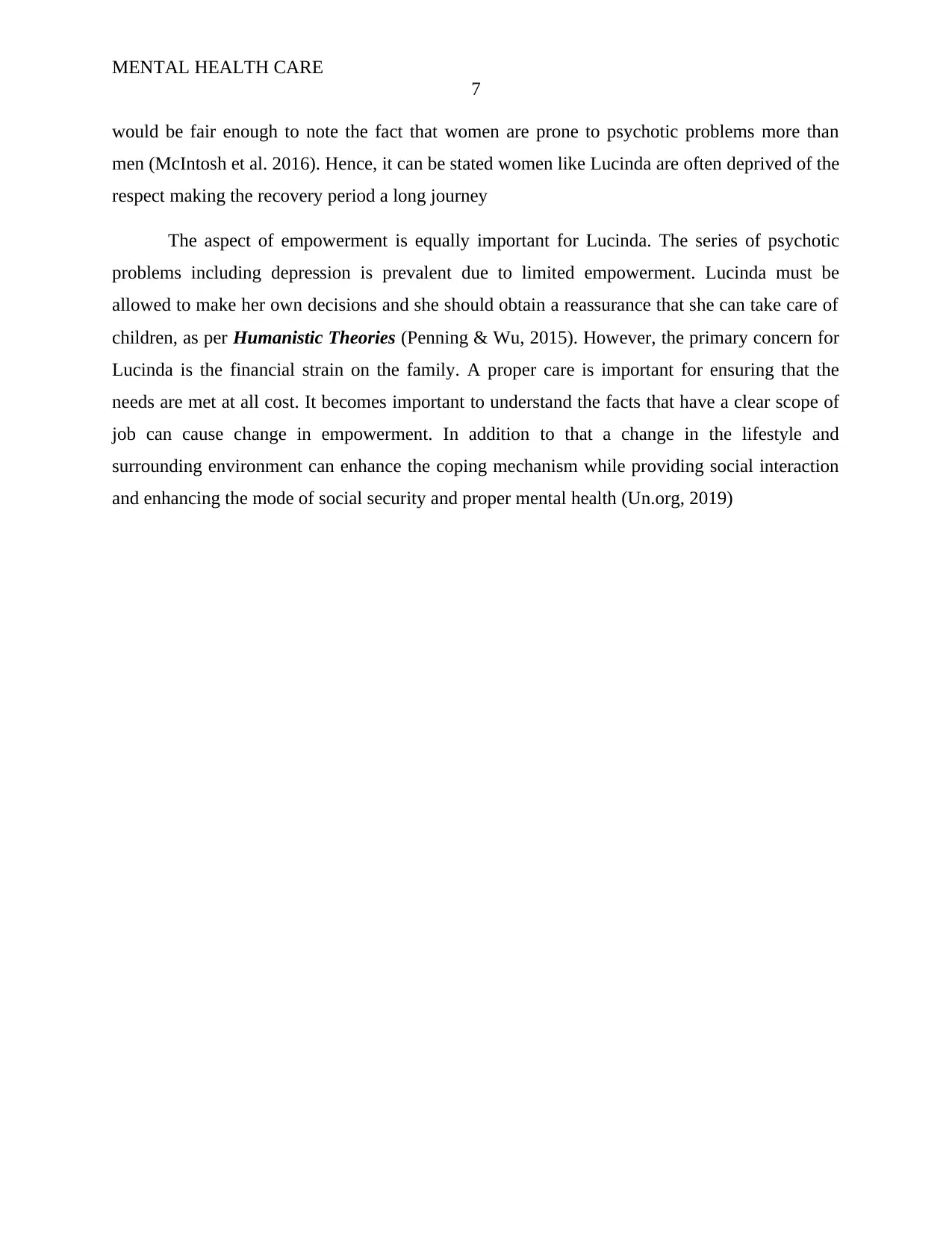
MENTAL HEALTH CARE
7
would be fair enough to note the fact that women are prone to psychotic problems more than
men (McIntosh et al. 2016). Hence, it can be stated women like Lucinda are often deprived of the
respect making the recovery period a long journey
The aspect of empowerment is equally important for Lucinda. The series of psychotic
problems including depression is prevalent due to limited empowerment. Lucinda must be
allowed to make her own decisions and she should obtain a reassurance that she can take care of
children, as per Humanistic Theories (Penning & Wu, 2015). However, the primary concern for
Lucinda is the financial strain on the family. A proper care is important for ensuring that the
needs are met at all cost. It becomes important to understand the facts that have a clear scope of
job can cause change in empowerment. In addition to that a change in the lifestyle and
surrounding environment can enhance the coping mechanism while providing social interaction
and enhancing the mode of social security and proper mental health (Un.org, 2019)
7
would be fair enough to note the fact that women are prone to psychotic problems more than
men (McIntosh et al. 2016). Hence, it can be stated women like Lucinda are often deprived of the
respect making the recovery period a long journey
The aspect of empowerment is equally important for Lucinda. The series of psychotic
problems including depression is prevalent due to limited empowerment. Lucinda must be
allowed to make her own decisions and she should obtain a reassurance that she can take care of
children, as per Humanistic Theories (Penning & Wu, 2015). However, the primary concern for
Lucinda is the financial strain on the family. A proper care is important for ensuring that the
needs are met at all cost. It becomes important to understand the facts that have a clear scope of
job can cause change in empowerment. In addition to that a change in the lifestyle and
surrounding environment can enhance the coping mechanism while providing social interaction
and enhancing the mode of social security and proper mental health (Un.org, 2019)
Paraphrase This Document
Need a fresh take? Get an instant paraphrase of this document with our AI Paraphraser
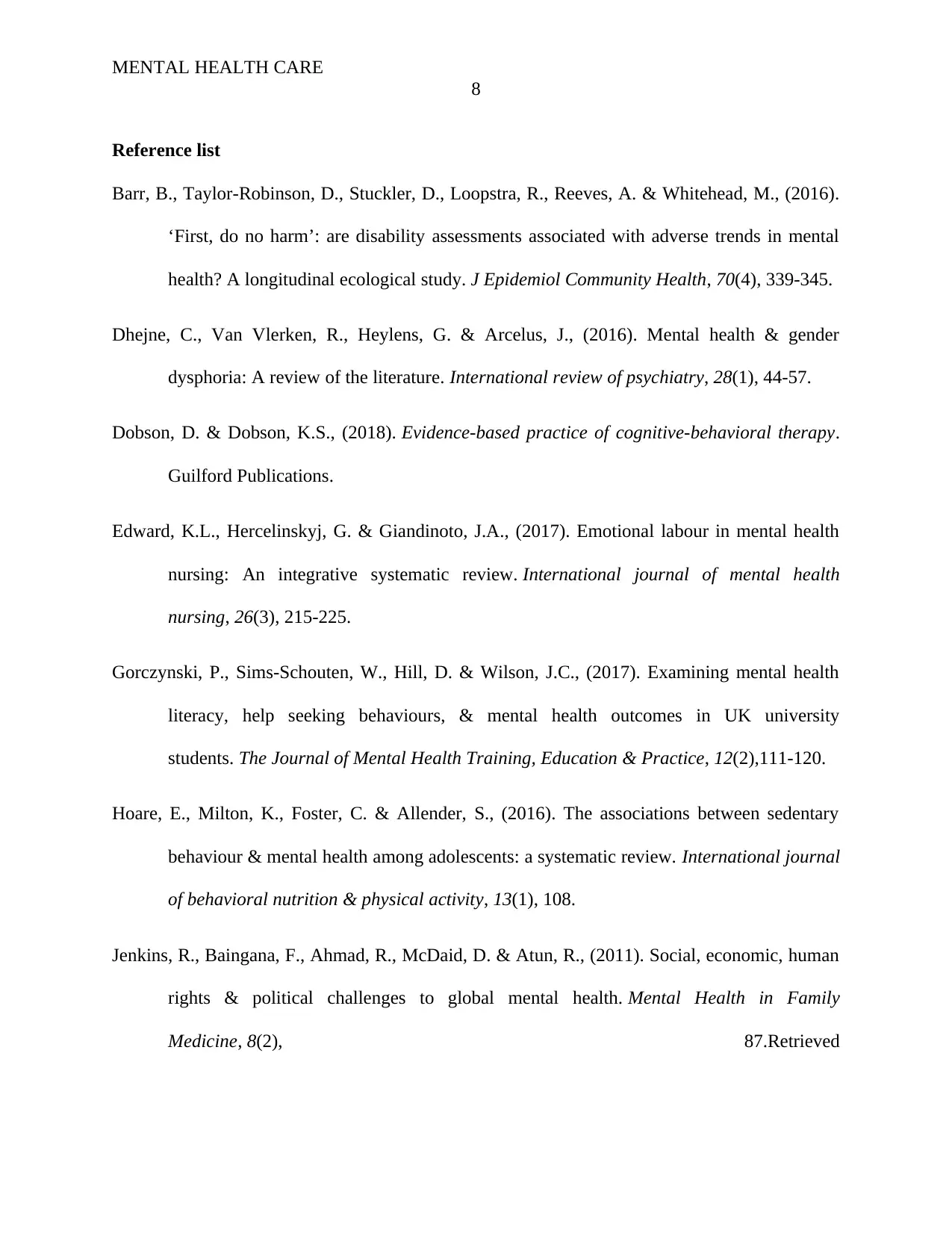
MENTAL HEALTH CARE
8
Reference list
Barr, B., Taylor-Robinson, D., Stuckler, D., Loopstra, R., Reeves, A. & Whitehead, M., (2016).
‘First, do no harm’: are disability assessments associated with adverse trends in mental
health? A longitudinal ecological study. J Epidemiol Community Health, 70(4), 339-345.
Dhejne, C., Van Vlerken, R., Heylens, G. & Arcelus, J., (2016). Mental health & gender
dysphoria: A review of the literature. International review of psychiatry, 28(1), 44-57.
Dobson, D. & Dobson, K.S., (2018). Evidence-based practice of cognitive-behavioral therapy.
Guilford Publications.
Edward, K.L., Hercelinskyj, G. & Giandinoto, J.A., (2017). Emotional labour in mental health
nursing: An integrative systematic review. International journal of mental health
nursing, 26(3), 215-225.
Gorczynski, P., Sims-Schouten, W., Hill, D. & Wilson, J.C., (2017). Examining mental health
literacy, help seeking behaviours, & mental health outcomes in UK university
students. The Journal of Mental Health Training, Education & Practice, 12(2),111-120.
Hoare, E., Milton, K., Foster, C. & Allender, S., (2016). The associations between sedentary
behaviour & mental health among adolescents: a systematic review. International journal
of behavioral nutrition & physical activity, 13(1), 108.
Jenkins, R., Baingana, F., Ahmad, R., McDaid, D. & Atun, R., (2011). Social, economic, human
rights & political challenges to global mental health. Mental Health in Family
Medicine, 8(2), 87.Retrieved
8
Reference list
Barr, B., Taylor-Robinson, D., Stuckler, D., Loopstra, R., Reeves, A. & Whitehead, M., (2016).
‘First, do no harm’: are disability assessments associated with adverse trends in mental
health? A longitudinal ecological study. J Epidemiol Community Health, 70(4), 339-345.
Dhejne, C., Van Vlerken, R., Heylens, G. & Arcelus, J., (2016). Mental health & gender
dysphoria: A review of the literature. International review of psychiatry, 28(1), 44-57.
Dobson, D. & Dobson, K.S., (2018). Evidence-based practice of cognitive-behavioral therapy.
Guilford Publications.
Edward, K.L., Hercelinskyj, G. & Giandinoto, J.A., (2017). Emotional labour in mental health
nursing: An integrative systematic review. International journal of mental health
nursing, 26(3), 215-225.
Gorczynski, P., Sims-Schouten, W., Hill, D. & Wilson, J.C., (2017). Examining mental health
literacy, help seeking behaviours, & mental health outcomes in UK university
students. The Journal of Mental Health Training, Education & Practice, 12(2),111-120.
Hoare, E., Milton, K., Foster, C. & Allender, S., (2016). The associations between sedentary
behaviour & mental health among adolescents: a systematic review. International journal
of behavioral nutrition & physical activity, 13(1), 108.
Jenkins, R., Baingana, F., Ahmad, R., McDaid, D. & Atun, R., (2011). Social, economic, human
rights & political challenges to global mental health. Mental Health in Family
Medicine, 8(2), 87.Retrieved
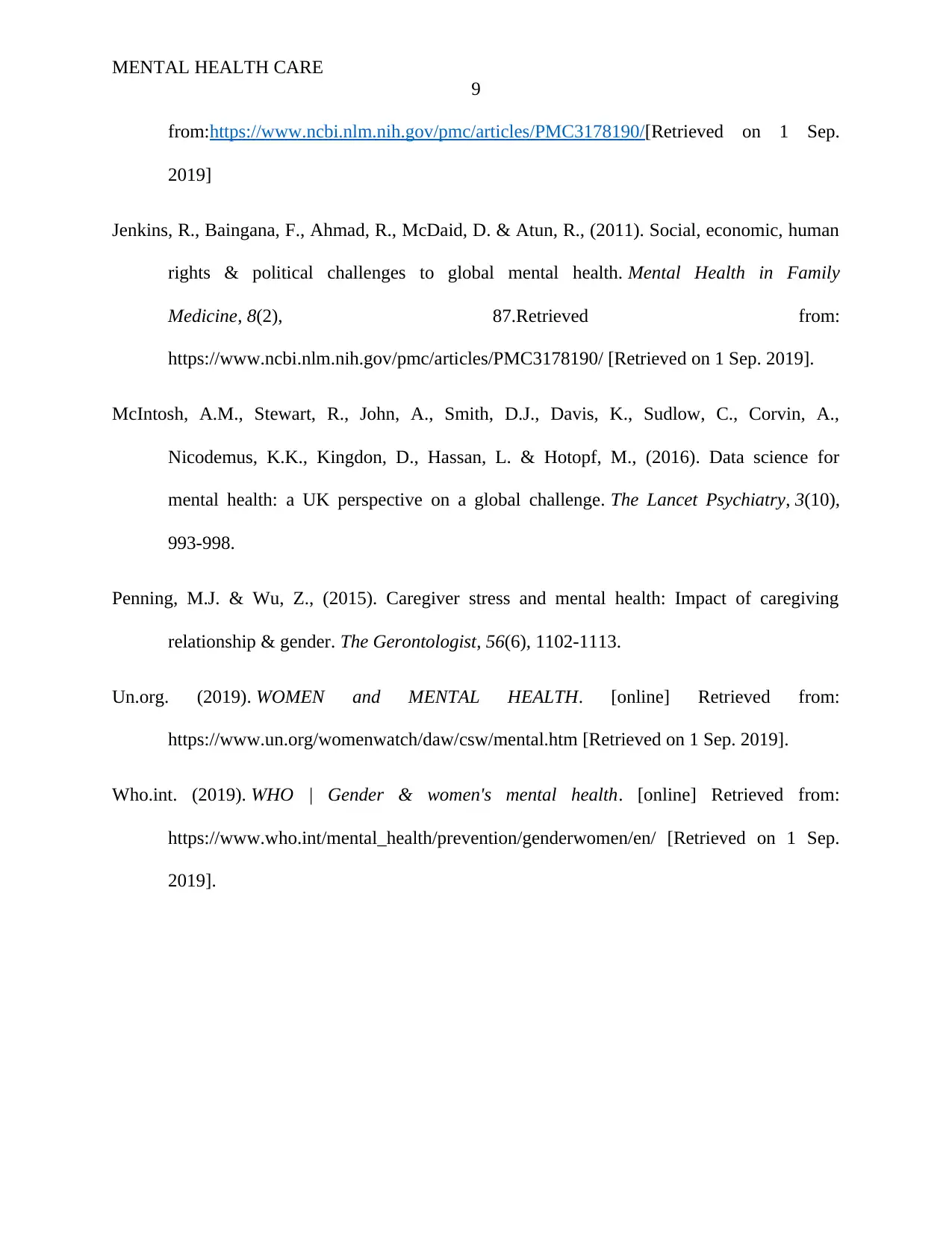
MENTAL HEALTH CARE
9
from:https://www.ncbi.nlm.nih.gov/pmc/articles/PMC3178190/[Retrieved on 1 Sep.
2019]
Jenkins, R., Baingana, F., Ahmad, R., McDaid, D. & Atun, R., (2011). Social, economic, human
rights & political challenges to global mental health. Mental Health in Family
Medicine, 8(2), 87.Retrieved from:
https://www.ncbi.nlm.nih.gov/pmc/articles/PMC3178190/ [Retrieved on 1 Sep. 2019].
McIntosh, A.M., Stewart, R., John, A., Smith, D.J., Davis, K., Sudlow, C., Corvin, A.,
Nicodemus, K.K., Kingdon, D., Hassan, L. & Hotopf, M., (2016). Data science for
mental health: a UK perspective on a global challenge. The Lancet Psychiatry, 3(10),
993-998.
Penning, M.J. & Wu, Z., (2015). Caregiver stress and mental health: Impact of caregiving
relationship & gender. The Gerontologist, 56(6), 1102-1113.
Un.org. (2019). WOMEN and MENTAL HEALTH. [online] Retrieved from:
https://www.un.org/womenwatch/daw/csw/mental.htm [Retrieved on 1 Sep. 2019].
Who.int. (2019). WHO | Gender & women's mental health. [online] Retrieved from:
https://www.who.int/mental_health/prevention/genderwomen/en/ [Retrieved on 1 Sep.
2019].
9
from:https://www.ncbi.nlm.nih.gov/pmc/articles/PMC3178190/[Retrieved on 1 Sep.
2019]
Jenkins, R., Baingana, F., Ahmad, R., McDaid, D. & Atun, R., (2011). Social, economic, human
rights & political challenges to global mental health. Mental Health in Family
Medicine, 8(2), 87.Retrieved from:
https://www.ncbi.nlm.nih.gov/pmc/articles/PMC3178190/ [Retrieved on 1 Sep. 2019].
McIntosh, A.M., Stewart, R., John, A., Smith, D.J., Davis, K., Sudlow, C., Corvin, A.,
Nicodemus, K.K., Kingdon, D., Hassan, L. & Hotopf, M., (2016). Data science for
mental health: a UK perspective on a global challenge. The Lancet Psychiatry, 3(10),
993-998.
Penning, M.J. & Wu, Z., (2015). Caregiver stress and mental health: Impact of caregiving
relationship & gender. The Gerontologist, 56(6), 1102-1113.
Un.org. (2019). WOMEN and MENTAL HEALTH. [online] Retrieved from:
https://www.un.org/womenwatch/daw/csw/mental.htm [Retrieved on 1 Sep. 2019].
Who.int. (2019). WHO | Gender & women's mental health. [online] Retrieved from:
https://www.who.int/mental_health/prevention/genderwomen/en/ [Retrieved on 1 Sep.
2019].
⊘ This is a preview!⊘
Do you want full access?
Subscribe today to unlock all pages.

Trusted by 1+ million students worldwide

MENTAL HEALTH CARE
10
10
1 out of 10
Related Documents
Your All-in-One AI-Powered Toolkit for Academic Success.
+13062052269
info@desklib.com
Available 24*7 on WhatsApp / Email
![[object Object]](/_next/static/media/star-bottom.7253800d.svg)
Unlock your academic potential
Copyright © 2020–2026 A2Z Services. All Rights Reserved. Developed and managed by ZUCOL.
![Mental Health and Wellbeing Report: [University Name], Semester 1](/_next/image/?url=https%3A%2F%2Fdesklib.com%2Fmedia%2Fimages%2Fob%2F76a73dbed3364ee18fbd23baba0664de.jpg&w=256&q=75)




